Intro
The importance of understanding kidney health cannot be overstated, as kidney disease can significantly impact an individual's quality of life. Stage 3 kidney failure, also known as stage 3 chronic kidney disease (CKD), is a critical phase where the kidneys are still functioning but are not working as well as they should. At this stage, it is crucial to take proactive measures to slow down the progression of the disease and prevent further damage. In this article, we will delve into the world of stage 3 kidney failure, exploring its causes, symptoms, and most importantly, ways to manage and potentially reverse the condition.
Kidney disease is often referred to as a "silent killer" because it can progress without noticeable symptoms until the later stages. However, being aware of the risk factors and taking preventive measures can make a significant difference. Factors such as diabetes, high blood pressure, family history of kidney disease, and age can increase the likelihood of developing kidney disease. Understanding these risk factors and managing them effectively is key to preventing the progression of stage 3 kidney failure.
As we navigate the complexities of stage 3 kidney failure, it becomes clear that a comprehensive approach is necessary. This includes lifestyle modifications, dietary changes, and in some cases, medical interventions. The goal is not only to slow down the progression of the disease but also to improve overall health and well-being. By adopting healthy habits and being proactive about kidney health, individuals can significantly reduce the risk of complications and improve their quality of life.
Understanding Stage 3 Kidney Failure
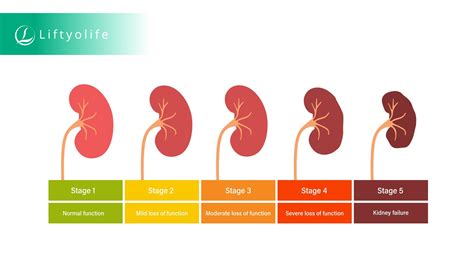
Understanding stage 3 kidney failure is the first step towards managing the condition effectively. At this stage, the kidneys are still functioning but are not filtering waste and excess fluids as efficiently as they should. This can lead to a buildup of toxins in the body, which can cause a range of symptoms including fatigue, swelling, and changes in urination. It is essential to work closely with a healthcare provider to monitor kidney function and make necessary adjustments to treatment plans.
Causes and Risk Factors
The causes and risk factors of stage 3 kidney failure are diverse and can include conditions such as diabetes and high blood pressure, which are the leading causes of kidney disease. Other risk factors include family history, age, and certain medical conditions. Understanding these risk factors can help individuals take preventive measures and reduce their likelihood of developing kidney disease.Managing Stage 3 Kidney Failure
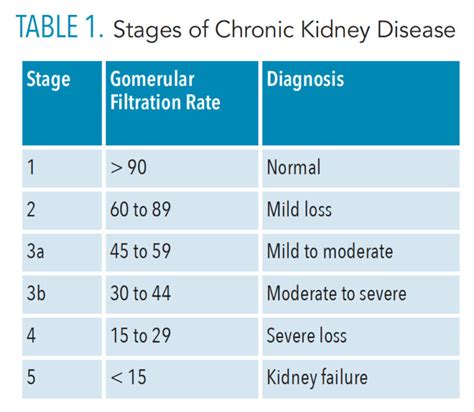
Managing stage 3 kidney failure requires a multifaceted approach that includes lifestyle modifications, dietary changes, and medical interventions. Here are five ways to manage stage 3 kidney failure:
- Dietary Changes: Making dietary changes is crucial for managing stage 3 kidney failure. This includes reducing protein intake, limiting phosphorus, potassium, and sodium, and staying hydrated. A renal dietitian can help create a personalized meal plan that meets individual needs.
- Blood Pressure Management: High blood pressure is a leading cause of kidney disease, and managing it is essential for slowing down the progression of stage 3 kidney failure. This includes taking medication as prescribed, reducing sodium intake, and engaging in regular physical activity.
- Blood Sugar Control: For individuals with diabetes, controlling blood sugar levels is critical for managing stage 3 kidney failure. This includes monitoring blood sugar levels regularly, taking medication as prescribed, and making lifestyle modifications such as increasing physical activity and losing weight.
- Smoking Cessation: Smoking is a significant risk factor for kidney disease, and quitting smoking can help slow down the progression of stage 3 kidney failure. There are many resources available to help individuals quit smoking, including counseling, support groups, and medication.
- Regular Monitoring: Regular monitoring of kidney function is essential for managing stage 3 kidney failure. This includes regular blood tests, urine tests, and imaging studies to monitor kidney function and detect any potential complications early.
Lifestyle Modifications
Lifestyle modifications play a critical role in managing stage 3 kidney failure. This includes engaging in regular physical activity, getting enough sleep, and managing stress. Regular physical activity can help lower blood pressure, improve blood sugar control, and reduce the risk of complications.Complications of Stage 3 Kidney Failure

Stage 3 kidney failure can increase the risk of complications such as cardiovascular disease, anemia, and bone disease. It is essential to work closely with a healthcare provider to monitor for these complications and take preventive measures.
Cardiovascular Disease
Cardiovascular disease is a leading cause of death in individuals with kidney disease. Managing risk factors such as high blood pressure, high cholesterol, and smoking can help reduce the risk of cardiovascular disease.Treatment Options for Stage 3 Kidney Failure
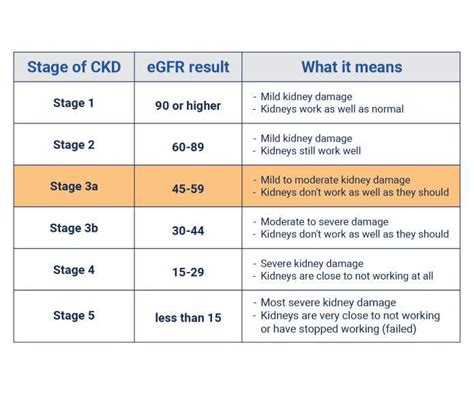
Treatment options for stage 3 kidney failure depend on the underlying cause of the disease and the individual's overall health. This can include medication, lifestyle modifications, and in some cases, dialysis or kidney transplantation.
Medication
Medication can help manage symptoms and slow down the progression of stage 3 kidney failure. This can include medications to control blood pressure, blood sugar levels, and cholesterol levels.Living with Stage 3 Kidney Failure
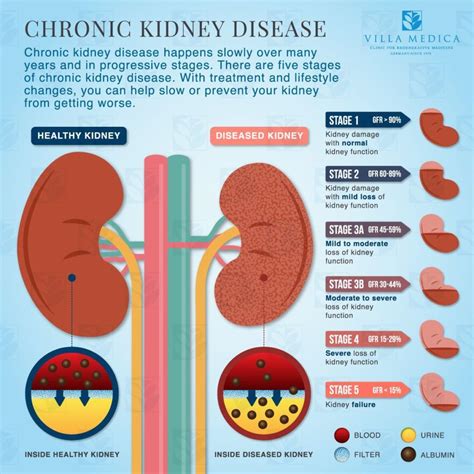
Living with stage 3 kidney failure requires a proactive approach to managing the condition. This includes working closely with a healthcare provider, making lifestyle modifications, and staying informed about the latest treatment options.
Coping with Emotions
Coping with emotions is an essential aspect of living with stage 3 kidney failure. This can include seeking support from family and friends, joining a support group, and engaging in stress-reducing activities such as meditation or yoga.Future Directions in Stage 3 Kidney Failure Management
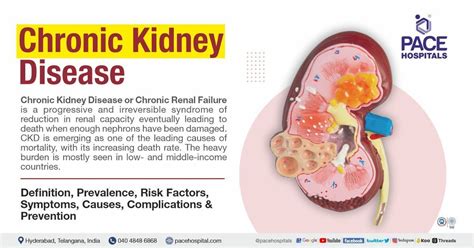
Future directions in stage 3 kidney failure management include the development of new medications and therapies, advances in dialysis and kidney transplantation, and a greater emphasis on preventive care.
Personalized Medicine
Personalized medicine is an emerging field that involves tailoring treatment to an individual's unique genetic and environmental profile. This can help improve treatment outcomes and reduce the risk of complications.What are the symptoms of stage 3 kidney failure?
+The symptoms of stage 3 kidney failure can include fatigue, swelling, changes in urination, and nausea. However, some individuals may not experience any symptoms at all.
Can stage 3 kidney failure be reversed?
+In some cases, stage 3 kidney failure can be reversed with prompt treatment and lifestyle modifications. However, this depends on the underlying cause of the disease and the individual's overall health.
What are the treatment options for stage 3 kidney failure?
+Treatment options for stage 3 kidney failure depend on the underlying cause of the disease and the individual's overall health. This can include medication, lifestyle modifications, and in some cases, dialysis or kidney transplantation.
As we conclude our journey through the world of stage 3 kidney failure, it becomes clear that managing this condition requires a proactive and multifaceted approach. By understanding the causes and risk factors, making lifestyle modifications, and staying informed about the latest treatment options, individuals can take control of their health and improve their quality of life. We invite you to share your thoughts and experiences with stage 3 kidney failure, and to join the conversation on social media using the hashtag #kidneyhealthmatters. Together, we can raise awareness and promote education about kidney disease, and support those affected by this condition.
